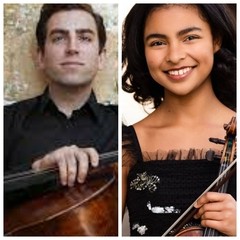|
Back
Joy! New York
Isaac Stern Auditorium, Carnegie Hall
10/13/2022 -
Heitor Villa-Lobos: Bachianas brasileiras No. 9
Valerie Coleman: Tracing Visions
Carol Simon: Between Worlds
Jessie Montgomery: Divided
Xavier Foley: An Ode to Our Times (World Premiere)
Ludwig van Beethoven: Sonata for Violin and Piano No. 9 in A Major, “Bridgetower”, Op. 47: 3. Presto (Arranged for string orchestra by Rubén Rengel)
Amaryn Olmeda, Hannah White (Violins), Tommy Mesa (Cello), Xavier Foley (Double-bass), Sphinx Virtuosi

T. Mesa/A. Olmeda
The only impediment I felt during this 25th Anniversary of the Sphinx Virtuosi is that they didn’t follow their eponymous title. The real Sphinx neither hears, nor speaks nor moves. These gorgeous 18 artists, with soloists and composer, had far too many words.
Their music spoke for itself. In fact, it sung for itself. Nobody needed all the introductions (enlightening as they were), since the sextet of works they played–four premieres and two transcriptions–were gorgeous, ravishing, all encompassing.
One felt it from their entrance. Like the earliest Orpheus Orchestra, Sphinx is a chamber group of strings. No conductor, no seats for violins and violas, dressed informally, young and obviously happy to be playing Carnegie Hall, those strings, by the way, were uniformly bright, the coordination transparent, and it was evident that each player could have been a soloist.
The bookend works were literally transcriptions, but had a sense of real originality. Heitor Villa‑Lobos had transcribed his Ninth Bachianas brasileiras from chorus to strings. And probably Villa‑Lobos, the most prolific and quickest composer since G.P. Telemann, probably did it between puffs of his cigar.
(A side‑note: Audrey Hepburn once told me she met Villa‑Lobos on the set of Green Mansions. He would read a scene, take out pen and paper, and before they’d even set up the cameras, he’d finish the background music.)
The piece last night gave the strings their chances with the Prelúdio, finishing with ravishing fugues, repeating themselves with some beautiful side‑melodies.
The concert finale, the last movement of the “Kreutzer” Sonata, had never been played by dedicatee, but had been written for the Black violinist George Bridgewater. Here, it was transcribed by Venezuelan Rubén Rengel–and it was so impressive, it sounded more like a transcription from a string quartet. Seamless, melodic, with Beethovenian propulsion.
The quartet of commissioned works, alas, had the same extraneous written program notes as those introductions. Each note was a variation on “the resilience of our people”, “a world in constant crisis”, “threads of empathy” etc. All well and good, but the four composers were deft in their own musical way.
Valerie Coleman’s Trading Visions started with a grim movement called “Till”, dedicated to the parents of children needlessly killed. The second, “Amandla”, took on the Zulu word for “power”. Some of it lagged, but most had a joyous dancing quality, verging on an America hoedown.
Carlos Simon’s Between Worlds was inspired by the paintings of Bill Taylor, born a slave in 1853, dying in 1949. An inspiring, ennobling almost unthinkable story (and I must read Leslie Umberger’s book Between Worlds). The result was a three‑minute work for solo violin, played with dazzling pyrotechnics by Amaryn Olmeda using every violin trick in the book. Wonderful, wonderful!!
The other non-ensemble piece was for–get this–violin and double‑bass by the Sphinx double‑bass player/composer Xavier Foley. An Ode to Our Times could have been titled “Utter Unity in Delicious Diversity”, for both instruments blended, imitated, became mutually involved.
Each of these works had a radiance, an almost artless joy of art. One work, Jessie Montgomery’s Divided, had, for these ears, something close to greatness. Cuban-American Tommy Mesa’s cello started with a solo, which was then enriched by the Sphinx ensemble and developing over a mere 12 minutes into a monumental and frankly gorgeous composition.
Divided, though, was a personal preference. The entire evening, lasting little more than an hour, was only incidentally an homage to diversity. It was instead a concert of inventiveness, virtuosity, and joy, real joy.
Harry Rolnick
|